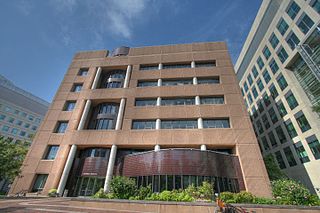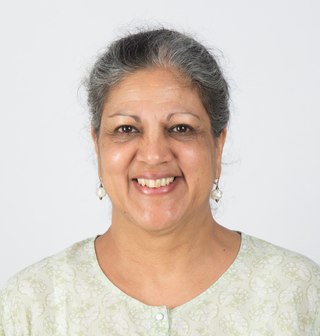Related Research Articles
Zoology is the scientific study of animals. Its studies include the structure, embryology, classification, habits, and distribution of all animals, both living and extinct, and how they interact with their ecosystems. Zoology is one of the primary branches of biology. The term is derived from Ancient Greek ζῷον, zōion ('animal'), and λόγος, logos.


The Rockefeller University is a private biomedical research and graduate-only university in New York City, New York. It focuses primarily on the biological and medical sciences and provides doctoral and postdoctoral education. It is classified among "R2: Doctoral Universities – High research activity." Rockefeller is the oldest biomedical research institute in the United States.

Randy Wayne Schekman is an American cell biologist at the University of California, Berkeley, former editor-in-chief of Proceedings of the National Academy of Sciences and former editor of Annual Review of Cell and Developmental Biology. In 2011, he was announced as the editor of eLife, a new high-profile open-access journal published by the Howard Hughes Medical Institute, the Max Planck Society and the Wellcome Trust launching in 2012. He was elected to the National Academy of Sciences in 1992. Schekman shared the 2013 Nobel Prize for Physiology or Medicine with James Rothman and Thomas C. Südhof for their ground-breaking work on cell membrane vesicle trafficking.

Elaine V. Fuchs is an American cell biologist famous for her work on the biology and molecular mechanisms of mammalian skin and skin diseases, who helped lead the modernization of dermatology. Fuchs pioneered reverse genetics approaches, which assess protein function first and then assess its role in development and disease. In particular, Fuchs researches skin stem cells and their production of hair and skin. She is an investigator at the Howard Hughes Medical Institute and the Rebecca C. Lancefield Professor of Mammalian Cell Biology and Development at The Rockefeller University.
William R. "Bill" Brinkley, was an American cellular biologist and scientific advocate and served as a Professor and Dean of the Graduate School of Biomedical Sciences at Baylor College of Medicine. Brinkley was recognized particularly for contributing to discovery of the attachment of chromosomes to the mitotic spindle apparatus.

Janet Rossant, is a developmental biologist well known for her contributions to the understanding of the role of genes in embryo development. She is a world renowned leader in developmental biology. Her current research interests focus on stem cells, molecular genetics, and developmental biology. Specifically, she uses cellular and genetic manipulation techniques to study how genes control both normal and abnormal development of early mouse embryos. Rossant has discovered information on embryo development, how multiple types of stem cells are established, and the mechanisms by which genes control development. In 1998, her work helped lead to the discovery of the trophoblast stem cell, which has assisted in showing how congenital anomalies in the heart, blood vessels, and placenta can occur.

Matthew P. Scott is an American biologist who was the tenth president of the Carnegie Institution for Science. While at Stanford University, Scott studied how embryonic and later development is governed by proteins that control gene activity and cell signaling processes. He co- discovered homeobox genes in Drosophila melanogaster working with Amy J. Weiner at Indiana University.

The James H. Clark Center at Stanford University, California, United States, is a building, completed in 2003, that houses interdisciplinary research in the biological sciences.
Lin He is a Chinese-American molecular biologist. She is an associate professor of cell and developmental biology at the University of California, Berkeley, in the Department of Molecular and Cell Biology, where she leads a lab focusing on identifying non-coding RNA which may play a role in tumorigenesis and tumor maintenance.

Lucy Shapiro is an American developmental biologist. She is a professor of Developmental Biology at the Stanford University School of Medicine. She is the Virginia and D.K. Ludwig Professor of Cancer Research and the director of the Beckman Center for Molecular and Genetic Medicine.
Joseph R. Ecker is an American plant biologist and molecular biologist. He is Professor of Plant Molecular and Cellular Biology Laboratory and Director of the Genomic Analysis Laboratory at the Salk Institute for Biological Studies. He is also an Investigator of the Howard Hughes Medical Institute. He holds the Salk International Council Chair in Genetics.

Sergiu P. Pașca is a Romanian-American scientist and physician at Stanford University in California. Pașca is a Professor of Psychiatry and Behavioral Sciences at Stanford University and the Bonnie Uytengsu and Family Director of Stanford Brain Organogenesis, a neuroscientist and stem cell biologist and currently a New York Stem Cell Foundation Robertson Investigator. He is part of the Stanford Neurosciences Institute, Stanford Bio-X and a fellow of the ChEM-H Institute at Stanford. Pașca was listed among New York Times Visionaries in Medicine and Sciences, and he is the recipient of the 2018 Vilcek Award for Creative Biomedical Promise from the Vlicek Foundation. In 2022, he gave a TED talk on reverse engineering the human brain in the laboratory
Carolyn Larabell is an American scientist, professor of Anatomy at the University of California, San Francisco and the Director of the National Center for X-ray Tomography. Her research focus on X-ray microtomography for life science and the imaging of cells.
Folami Ideraabdullah is an American geneticist and assistant professor in the Department of Genetics and the Department of Nutrition at the Gillings School of Global Public Health at the University of North Carolina at Chapel Hill. Ideraabdullah explores how maternal nutrition and environmental toxin exposure affect development through exploring epigenetic changes to DNA. She has found that maternal Vitamin D deficiencies can cause genome-wide changes in methylation patterns that persist for several generations and impact offspring health. Her international collaboration with the University of Witwatersrand represents the first time that metal levels in the placenta have been investigated in relation to birth outcomes in South Africa.

Jyotsna Dhawan is an Indian Cell and Developmental Biologist, Emeritus Scientist at Centre for Cellular and Molecular Biology and Visiting Professor, Institute for Stem Cell Science and Regenerative Medicine (inStem). Dhawan's research has focused on adult stem cell function and skeletal muscle regeneration. Dhawan is the current (2019-2021) President of the Indian Society for Cell Biology and the Indian Society of Developmental Biologists (2017-2020). Dhawan was elected as a fellow to the Indian National Science Academy in 2019.
Natalia Gomez-Ospina is a Colombian physician-scientist who studies genetic disorders and lysosomal storage disorders. She was born in Medellín, Colombia. She is an Assistant Professor of Pediatrics (Genetics) and of Pediatrics at Stanford University and works at Lucile Packard Children's Hospital. She is a member of Stanford Bio-X.
Marisa Bartolomei is an American cell biologist, the Perelman Professor of Cell and Developmental Biology and Co-Director of the Epigenetics Institute at the Perelman School of Medicine at the University of Pennsylvania. Her research considers epigenetic processes including genomic imprinting. She was elected to the National Academy of Sciences in 2021.
Elizabeth Patton, Ph.D FRSE is professor of chemical genetics and group leader of Medical Research Council Institute for Genetics and Molecular Medicine (IGMM) Human Genetics Unit in Edinburgh, Personal Chair of Melanoma Genetics and Drug Discovery for a disease which kills 20,000 Europeans a year, and accounts for 80% of all skin cancer deaths. Her research into the genetic models and drug interactions testing, sharing international findings, is mainly using zebrafish in conjunction with the Edinburgh Cancer Research Centre. She holds a number of academic leadership roles in UK, Europe and international scientific bodies.
Beatriz Rico is a professor of developmental neurobiology at King's College London. Her research focuses on neural circuit development.
References
- ↑ "Baker Lab" . Retrieved 2021-01-18.
- ↑ "Human Embryonic Stems Cells: Science, Ethics, and Politics - YouTube". www.youtube.com. Retrieved 2021-01-18.
- 1 2 "Julie Baker | Stanford Medicine Profiles". med.stanford.edu. Retrieved 2021-01-18.
- ↑ University, © Stanford; Stanford; California 94305 (2014-03-05). "Julie Baker - Associate Professor of Genetics". Welcome to Bio-X. Retrieved 2021-01-18.
- 1 2 "Julie C Baker Profile". ResearchGate.
- ↑ "Clues To Ancestral Origin Of Placenta Emerge In Genetics Study". ScienceDaily. Retrieved 2021-01-18.
- ↑ Hernandez, Daniela (2016-12-09). "The Quest to Untangle Why Pregnancy Can Turn Deadly". Wall Street Journal. ISSN 0099-9660 . Retrieved 2021-01-18.
- ↑ "How Transposons Shaped Pregnancy". The Scientist Magazine®. Retrieved 2021-01-18.
- ↑ "Supporting "curiosity-driven research" at the Discovery Innovation Awards". Scope. 2019-03-22. Retrieved 2021-01-18.